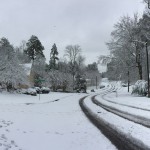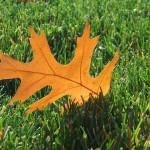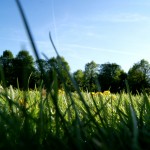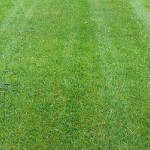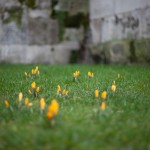
ForRaleigh, NChomeowners, figuring out which type of grass is best to plant in your lawn can be tricky. There are so many factors to consider; everything from drainage, sunshine, to the terrain can be a potential determinant for what to fill your yard with and where. Different grass types thrive in different environments.
North Carolina can be divided into three major regions: the mountains, the piedmont, and the coastal plain area. These three regions differ in determinants such as climate, elevation, and humidity. Depending on where homeowners live depends on which grass types thrive where.
Much likegrass types in Nashville, TN, grass types in Raleigh, NC can be divided into two main categories, warm-season or cool-season grasses, and branch off from there. Cool-season grasses do better in the cooler times of the year, thriving in temperatures from 65 to 75 degrees. While warm season grasses, are best adapted to to temperatures between 80 to 95 degrees.
Mountain Region Grasses
山上有一些最重要的climate fluctuations in the Southeast. Take two cities – Highlands and Marshall – just separated by a two hours’ drive into consideration. Certain towns around Highlands are wet enough to be considered rainforests and have waterfalls everywhere. Whereas Marshall sits at the north end of the French Broad River basin. And it’s actually one of the driest areas in the entire state of North Carolina because most of the rainfall is squeezed out by the Basalm and Smoky mountains. All things considered, homeowners should either do their research or consult with a professional before deciding on a grass type in the Mountain Region.
- Tall fescue, mostly populated in the transition zone of the US, is considered both a heat tolerant cool season grass as well as relatively low maintenance. It has fairly wide leaf blades and should be mowed around 3 inches. Tall fescue is healthiest around 3500 to 7500 feet.Recommended:Pennington Kentucky 31 Tall Fescue Grass Seed
- Kentucky bluegrassis spread over all of the cool, humid parts of the US and is identified by its boat shaped leaf tip. The dense sod produces new shoots primarily in the spring and late summer. Kentucky bluegrass is healthiest when it’s mowed around 3.5 inches. Overseeding bluegrass turf with perennial ryegrass or different mixtures of bluegrass and ryegrass proves to act as a suppression of Fusarium blight, a disease that causes a bleaching of leaves and severe rotting of roots.Recommended:Scotts Turf Builder Kentucky Bluegrass Mix Grass Seed
- Perennial ryegrassis the most popular grown cool-season grass in the world. There a ton of reasons why perennial ryegrass has numerous desirable agronomic qualities. Their roots establish rapidly, have a long growing season, and naturally possess high nutrients. Ryegrass grow best on well-drained soil where it’s too wet for most other grass types.Recommended:Scotts Turf Builder Perennial Ryegrass Mix Grass Seed
- Fine fescueis very cold tolerant, high density grass. It does surprisingly well in poor soil conditions, i.e. rocky, sandy, clay. Though it is drought resistant it will go dormant and has a good to very good shade tolerance. It also does excellent in high elevations. However, it is subject to become thatchy.Recommended:WaterSaver Grass Mixture with Turf-Type Tall Fescue
Piedmont Region Grasses
Piedmont is French for “foot of the mountain”. The piedmont region is filled with rolling hills and sometimes is referred to as a plateau. Because the elevation doesn’t deviate as much as the Mountain Region both warm-season and cool-season grass types thrive in this region.
Cool-season varieties
- Tall fescue
- Kentucky bluegrass
- Perennial ryegrass
- Fine fescue
Warm-season varieties
- Bermudahas excellent to heat and drought tolerance and low water use rate. It’s one of the toughest grass types used in the desert areas of the southwest. It’s a pretty dense sod and is also pretty tolerant to traffic. Grows on hard and shallow soils better than most other grass types. Bermuda is typically excellent at out-competing weeds because it has specialized growth stems and a relatively rapid growth rate.Recommended:Scotts EZ Seed Patch and Repair Bermudagrass
- Zoysiais a warm native grass that is actually native to China, Japan, and other regions in various parts of Southeast Asia. Zoysia is dormant and turns brown after the first hard frost and are among one of the first grasses to turn lush and green during the spring. The leaf blades are smooth and are sharply pointed.Recommended:Scotts Turf Builder Zoysia Grass Seed
- Centipedeis another hardy grass type that has received most of its popularity because of its adaption to low fertility conditions and easy maintenance. It has adapted particularly well in the sandy, acid soils around southeastern US. Centipede is slightly more cold tolerant than St. Augustine and is coarsely textured. It’s nickname is “lazy man’s grass” and requires less mowing than St. Augustine or Bermuda grass types. Centipedegrass is moderately shade tolerant, but grows best in full sunlight.Recommended:Scotts EZ Seed Patch and Repair Centipede Grass
- St. Augustineis healthiest in moist, warm climates and fertilization and drainage should be plentiful. Homeowners who have a soil pH balance between 5.0 and 8.5 could consider St. Augustine, it’s appearance develops a chlorotic appearance in high alkaline soils. It also doesn’t tolerate traffic very well.
Coastal Plains Region Grasses
The Coastal Plains Region stretches from the sandy farmland of the Inner Coastal Plain to the state’s Outer Banks. Typically warm-season grass types work best here due to the nature and climate of the area.
- Bermuda
- Zoysia
- Centipede
- St. Augustine
Additional information may be required to make an educated decision on which grass type to use for your new or existing lawn. Hopefully these facts can help you make a conscious decision or at least get you started on the right track when it comes to pinning down what kind of grass type to use in your lawn.
Questions aboutlawn care in Raleigh, NC? Share your thoughts in the comments below.
